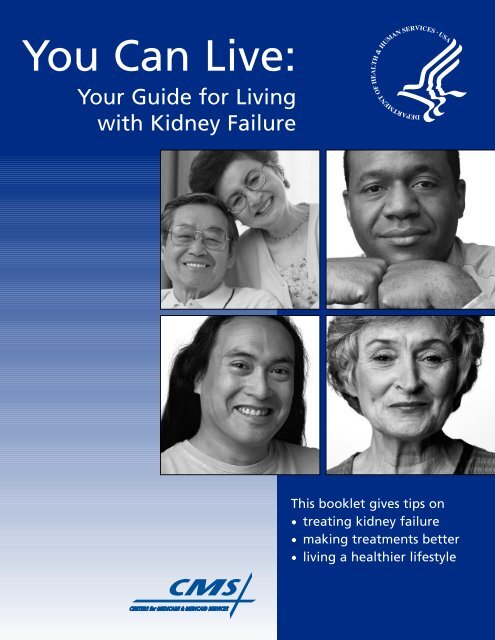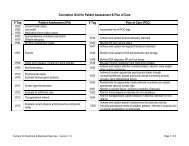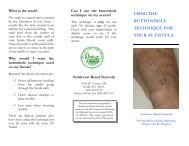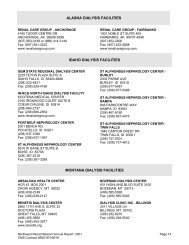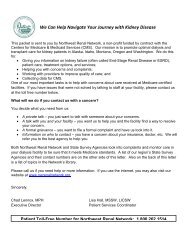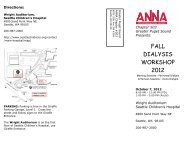Medicare's "You Can Live: Your Guide For Living With Kidney Failure"
Medicare's "You Can Live: Your Guide For Living With Kidney Failure"
Medicare's "You Can Live: Your Guide For Living With Kidney Failure"
- No tags were found...
You also want an ePaper? Increase the reach of your titles
YUMPU automatically turns print PDFs into web optimized ePapers that Google loves.
<strong>You</strong> <strong>Can</strong> <strong>Live</strong>:<strong>You</strong>r <strong>Guide</strong> for <strong>Living</strong>with <strong>Kidney</strong> FailureThis booklet gives tips on• treating kidney failure• making treatments better• living a healthier lifestyle
Dear Reader,The Centers for Medicare & Medicaid Services is pleased to provide you with thisbooklet. Medicare wants to make sure that you get good care and the information youneed to make informed choices about the treatment of kidney failure. The informationin this booklet was reviewed by doctors, nurses, and patients and will help newkidney failure patients as they begin dialysis or prepare for transplantation.If you are a kidney patient, it’s important for you to learn as much as you canabout your illness and to take an active role in your care. If you are a family member orcaregiver, learning about kidney disease and its treatment will help both you and theperson with kidney failure. If you have questions, don’t be afraid to ask your healthcare team for help.<strong>You</strong>r local End Stage Renal Disease (ESRD) Network can help you if you have aproblem. Their phone number is on page 39. ESRD Networks assist patients needinginformation, help with care concerns, and with resolving complaints. ESRD Networksalso work on improving the quality of care in dialysis facilities and keep your facilityaware of important dialysis and transplant issues.We hope this booklet will be helpful to you as you start dialysis or prepare fora transplant.Best Regards,Centers for Medicare & Medicaid ServicesLook atwww.medicare.govon the web or call1-800-MEDICARE(1-800-633-4227)to get help withyour Medicarequestions.
Table of Contents2<strong>Living</strong> with <strong>Kidney</strong> Failure:<strong>You</strong> Are Not Alone3 What <strong>You</strong> May Be Feeling4Paying for Treatmentor Transplant5 Treating <strong>Kidney</strong> Failure5 When <strong>Kidney</strong>s Fail6 <strong>You</strong>r Treatment Options6 Hemodialysis10 Hemodialysis Checklist11 Questions to Ask <strong>You</strong>rHemodialysis Center Staff12 Peritoneal Dialysis15 Transplant17 The Choice to Stop Treatment17 Advance Directives18 <strong>You</strong> and <strong>You</strong>r Health Care Team21Tips for Making Treatment Better21 Changes in Mental Health22 Physical Changes22 Changes in Sexual Desire23 Talk with <strong>You</strong>r Doctors23 Take <strong>You</strong>r Medicine As Prescribed24 Beware of Over-the-CounterMedicine and Other Remedies25 Alternative Treatments26 Vaccinations26 Track <strong>You</strong>r Dialysis TreatmentProgress31Tips for <strong>Living</strong> with <strong>Kidney</strong>Failure31 Following <strong>You</strong>r Diet andFluid Intake Plan33 Make an Exercise Plan34 Going Back to Work35 Plan Ahead for Travel36 How to File a Complaint36 <strong>You</strong>r ESRD Network36 <strong>You</strong>r State Survey Agency37 <strong>You</strong>r Rights38 <strong>You</strong>r Responsibilities39<strong>Kidney</strong> Failure Resources39 ESRD Networks40 State Survey Agencies44 Additional <strong>Kidney</strong> FailureResources
<strong>Living</strong> with <strong>Kidney</strong> Failure:<strong>You</strong> Are Not Alone“Understandingkidney failure andtaking an activerole in your caremay lessen someof your fears andhelp you dealwith the changesin your life.”When your kidneys stop working, your life changes. At first, youmay ask yourself “Why me?” <strong>You</strong> may have fears about dying ortreatment. Because kidney failure is a serious condition that mustbe treated for the rest of your life, it can be hard to accept.Understanding more about kidney failure may lessen some ofyour fears and help you deal with the changes in your life.Learning about your treatment and how to take an active role inyour care puts you in charge. <strong>You</strong> can control things like followingyour treatment plan and diet and keeping a good outlook onlife. <strong>You</strong>r health care team will work with you to make a care planthat’s best for you and will help you manage your treatment. <strong>You</strong>can also look to your family and friends for support. Rememberthat you are not alone. Nearly 350,000 people of all ages livewith kidney failure. There is hope and there are ways to rebuildyour life.2
What <strong>You</strong> May Be Feeling<strong>Kidney</strong> failure may mean some changes in your life, but youcan still do many of the things that you enjoy. Try to stay positive,and talk to someone who understands what you are goingthrough, such as another person with kidney failure or a counselor.<strong>You</strong> can also set goals to• stay active.• do the things you did and enjoyed before kidney failure.• return to work, school, or volunteering.• pursue new interests.• live the best life you can.Learning to live with kidney failure can take time, so don’t bediscouraged. Talk with your loved ones about how you feel.Listen to what they have to say too. Some days you may feel likegiving up or may be angry that your life isn’t the same as it wasbefore. See your doctor or social worker right away if these feelingsof sadness or anger don’t go away, if you are using drugs oralcohol to cope, or if you have thoughts of taking your life. <strong>You</strong>don’t have to deal with your feelings alone. <strong>You</strong>r loved ones, otherswith kidney failure, and your health care team can help.Dealing with your feelings will help you live a full life.“<strong>Kidney</strong> failuremay mean somechanges in yourlife, but you canstill do many ofthe things thatyou enjoy.”3
Paying for <strong>You</strong>r Treatment orTransplant“<strong>You</strong>r socialworker can helpyou understandhow to pay fordialysis treatmentor transplant.”<strong>You</strong>r social worker can help you understand how to pay fordialysis treatment or transplant. Ask about Medicare prescriptiondrug coverage, private, state, or local programs that help pay forprescriptions or medications. <strong>You</strong>r social worker can also explainyour health insurance coverage. In addition to Medicare, youmay have coverage through the following:• Private Health Insurance• Veterans Benefits• State Medical Assistance (Medicaid)• State <strong>Kidney</strong> Programs• TRICARE (for people who are active or retired from themilitary service)• Railroad Retirement Board<strong>For</strong> more information on Medicare, or to get a copy of the booklet,“Medicare Coverage of <strong>Kidney</strong> Dialysis and <strong>Kidney</strong>Transplant Services,” look at www.medicare.gov on the web. Or,call 1-800-MEDICARE (1-800-633-4227). TTY users shouldcall 1-877-486-2048.<strong>You</strong> can also contact Medicare to find your local office for theState Health Insurance Assistance Program (SHIP), where youcan get one-on-one counseling on Medicare, Medicaid, andMedigap health insurance coverage. SHIP counselors can explainyour Medicare bills and your Medicare rights. They can tell youhow to deal with payment denials or appeals, how to choose aMedicare health plan, how to buy Medigap, a supplemental insurancepolicy, or how to choose and join a Medicare drug plan.4
Treating <strong>Kidney</strong> Failure“<strong>Kidney</strong> failureis also calledEnd StageRenal Diseaseor ESRD.”When <strong>Kidney</strong>s Fail<strong>You</strong>r kidneys are just below your rib cage in the middle of yourback. They are twin organs shaped like kidney beans. Healthy kidneyswork all day, everyday, to clean your blood and make urinethat flows into your bladder. <strong>Kidney</strong>s also make hormones thathelp control your blood pressure and help make red blood cells,which carry oxygen through your body. They also help balance thelevel of many minerals and chemicals in your body.<strong>Kidney</strong> failure occurs when kidneys can’t clean your blood or ridyour body of extra fluid. When this happens, you feel sick. Whenyour kidneys slowly stop working over time or slow down so thatwastes are not filtered out, it’s called Chronic <strong>Kidney</strong> Disease(CKD). Many diseases can cause CKD. Some of the most commoncauses are diabetes and hypertension.When kidneys stop working completely or when they can’t workwell enough to keep you healthy without dialysis or a transplant,it’s called End Stage Renal Disease (ESRD). When ESRD occurs,it must be treated for the rest of your life. <strong>You</strong> must have eitherdialysis or a kidney transplant to live.5
<strong>You</strong>r Treatment Options“Hemodialysisusually occursthree times aweek for aboutfour hourseach time.”To treat kidney failure, you may go on dialysis or have a kidneytransplant. Dialysis is a medical term that means to clean theblood by artificial means, like using an artificial kidney. There aretwo kinds of dialysis: hemodialysis and peritoneal dialysis. Eachkind works well and can be done at your home or at a treatmentcenter. A transplant is another treatment option that you shouldtalk to your doctor about. <strong>With</strong> a transplant, you no longer needdialysis. A transplant is when you get a kidney from someoneelse, and the kidney is put into your body with surgery. A kidneytransplant isn’t the right treatment for everyone, but everyoneshould be evaluated to see if it’s the right treatment. Talk to yourdoctor to find out if a kidney transplant is right for you.<strong>You</strong> may need to change the kind of treatment you get for medicalor other reasons, such as a change in where you work or live.To determine what type of treatment is best for you, you andyour health care team need to consider the following:In-Center Hemodialysis• <strong>You</strong>r type of kidney disease.• How far you live from a treatment center.• <strong>You</strong>r physical abilities.• <strong>You</strong>r support system.• <strong>You</strong>r lifestyle and emotional health.HemodialysisHemodialysis uses a machine to clean yourblood. The dialysis machine has afilter called a hemodialyzer ordialyzer. The dialyzer workslike an artificial kidney andremoves the wastes and theextra fluid that builds up when yourkidneys are not working.6
Hemodialysis can’t do all the work yourkidneys did. Healthy kidneys work all day,everyday. Hemodialysis usually occurs threetimes a week for about four hours eachtime. <strong>You</strong>r time is based on your needs.<strong>You</strong>r kidney doctor orders the length ofyour treatment in order to help meet yourbody’s needs.HomeHemodialysisDuring a hemodialysis treatment, yourblood is carried through plastic tubes tothe dialyzer to be cleaned. Once yourblood is cleaned, it’s returned from thedialyzer to your body through anotherplastic tube. Only about one cup ofblood travels through the dialysismachine at a time.Hemodialysis can be done at an outpatient treatment center orin your home. <strong>For</strong> home hemodialysis, you and a family memberor caregiver will need to be trained on how to safely do each stepof the treatment. Equipment and supplies are sent to you if youdialyze at home. Not all centers offer home hemodialysis trainingand support. Ask your kidney doctor if this is an option for you.In a center, nurses and technicians with special training carry outthe steps of your treatment. In some centers, you can also betrained to do some or all of the steps of your treatment. Takingan active role in your treatment may help you feel more in control.At the center, your dialyzer may or may not be re-used. Reuseis when the dialyzer is specially cleaned and tested after yourtreatment and kept for you to use at your next treatment.<strong>For</strong> hemodialysis, you need a way for blood to be safely removedand returned to your body. Most blood vessels are not strongenough or big enough to carry blood to and from the dialysismachine. To do this you need surgery to create a pathway calledan access. An access can be in your arm, leg, chest or neck.“<strong>For</strong> homehemodialysis, youand a familymember orcaregiver willneed to betrained on howto safely do eachstep of thetreatment.”7
There are three kinds of access—Fistula, Graft, and Catheter.“There are threekinds of access—Fistula, Graft, andCatheter.”• A fistula or arteriovenous fistula (AVF) surgically connects anartery and a vein. A fistula needs weeks to months to heal and“mature” before it can be used. When a fistula matures, itbecomes larger and stronger and better for dialysis. It’sconsidered the best access because it lasts longer, has fewerproblems, gives better hemodialysis results, and can lower therisk of infection. <strong>With</strong> a fistula, you can improve your qualityof life and length of life. A fistula isn’t right for everyone, butyou should be evaluated for a fistula, and given one if it’s thebest access for you. It’s best to get a fistula before you needdialysis so that it can be ready for use when you need it.• A graft or arteriovenous graft (AVG) uses special tubing tosurgically connect an artery and vein. A graft needs lesshealing time than a fistula. However, a graft must bereplaced every so often.• A catheter makes a temporary access by inserting a soft,flexible tube into a vein in the neck, chest, or groin. Acatheter can be used as soon as it’s in place.Fistula Access Cross-Section<strong>For</strong> each hemodialysis treatment, two needles are put into youraccess. Each needle is connected to a plastic tube. One line takesthe blood with wastes out of your body. The other tube carriesthe clean blood back into your body.8
The dialysis machine controls how quickly your blood movesthrough the tubing and how much water is being removed.Some machines measure your blood pressure too. In a center, thenurse and technician monitor your vital signs, the amount offluid removed and machine settings during your treatment. Ifyou get dialysis at home, you and your care partner are taughthow to do your monitoring.Care of your Hemodialysis AccessAn access that works well will help keep you healthy. Membersof your hemodialysis team will teach you how to take care ofyour access. When you wake every morning, check for a strongpulse and a buzzing or rushing feeling in your access. This iscalled a “thrill” and is a sign of good blood flow. Also check youraccess for early signs of infection. Signs can be redness, swelling,or feeling warm to the touch. If you see signs of infection, can’tfeel your thrill, or have other problems with your access, callyour kidney doctor and treatment center right away.“Every morning,check for a strongpulse and abuzzing feeling inyour access.”<strong>You</strong> can help keep your access working well. Keep your accessclean and dry between treatments. Don’t let anyone take yourblood pressure, draw your blood, or put an IV into the arm orleg that has your access. Don’t wear jewelry or tight clothes on,over, or above your access. If your access is in your arm, don’tcarry a bag or purse on that arm. Also avoid sleeping on the armor leg where your access is. Try not to bump your access, andnever cut it. Remember that your access is your lifeline.9
Hemodialysis ChecklistBefore every hemodialysis treatment, you should¢ wash your hands before going to your chair.¢ if you have fistula or graft access, clean your access before going to your chair.If you have a catheter, keep the dressing clean and dry. Be sure a member of yourhealth care team cleans and changes the dressing at each treatment.¢ tell your nurse or doctor if you have concerns about how you are feeling.¢ tell your nurse if you have any nausea, pain, vomiting, diarrhea, or constipation.¢ check that your dialyzer has your name on it if your center re-uses dialyzers.<strong>For</strong> every hemodialysis treatment, your nurse or technician should¢ wash his or her hands and put on new gloves before putting in your needles.¢ ask how you have been feeling and eating.¢ check your access for good blood flow and early signs of infection.¢ program your machine to your kidney doctor’s hemodialysis orders.¢ check for any cleaning fluid in the dialyzer.¢ take your weight, temperature, heart rate, and blood pressure. They should writethem down on your treatment sheet or put them into a computer.¢ check your machine’s alarms, which includes the temperature and conductivity.They should write the numbers down on your treatment sheet or put them into acomputer.¢ check that the right size needles and correct heparin dose are set up for yourtreatment. (Heparin is a drug that keeps blood from clotting.)¢ check for the correct potassium concentration.¢ listen to the front and back of your chest with a stethoscope.¢ check your legs and feet for swelling.¢ write down your treatment results or put them into a computer.10
Questions to Ask your Hemodialysis Center Staff¢ Does my treatment time affect when I should take my prescribed medicines?¢ How should I plan what I eat around my treatment time?¢ Do I have to get treatment at the center my doctor recommends?¢ Does the center set times for treatment or is it first come, first serve?¢ <strong>Can</strong> I ask for a treatment time that works best for me?¢ Are there staff who speak the same language as I do?¢ Who reviews my monthly lab work with me?¢ If the center re-uses dialyzers, how will I know the dialyzer is mine?¢ How often does the doctor see people during treatment?¢ What kind of patient education does the center offer?¢ Does the center teach home dialysis?¢ Will the center allow me to do some or all of my treatment steps?¢ What are the times that the social worker or dietitian can see patients?¢ <strong>Can</strong> I get help with care planning and making an advanced directive?¢ Does the center have an exercise program or a place and equipment for exercise?¢ What are the center’s hours during a holiday?¢ What things will I be billed for that are not covered by Medicare or my insurance?¢ What are my transportation options for getting to and from the dialysis center?¢ <strong>Can</strong> I have visitors during my treatment?¢ Is there a staff member or patient that will talk to me if I get depressed?¢ Will I have my own TV? Are there headphones to keep out noise?¢ If I go on a trip or have to go to the hospital, will the center hold my treatmenttime for me? <strong>For</strong> how long?¢ When was the last health and safety inspection or survey of the center?Were there any problems and have they been fixed?11
Peritoneal DialysisPeritoneal dialysis (PD) uses the space in your belly called theperitoneal cavity to clean your blood. PD doesn’t use a dialyzer.This space is lined with a membrane called the peritoneum. Itsurrounds and protects your intestines, bowel, and other organs.The membrane has many tiny holes that can be used to filterwaste out of your blood while keeping blood cells and proteinsin your vessels.“<strong>You</strong>r kidneydoctor will tell you how many exchanges you should do each day.”PD usually works all day, everyday. To have PD you must havean access, which is a soft, flexible tube called a catheter surgicallyplaced in your belly. The bottom part of the tube is put into theperitoneal cavity. The middle part of the tube runs under yourskin. The top part stays outside of your body and can be tapedagainst your skin.A liquid called dialysate travels through the catheter and fills theempty space in your belly. This liquid stays in the space whilewaste products and extra fluid move from your blood throughthe membrane into the dialysate. The dialysate with the wasteproducts and extra fluid is then drained out of your body. Nextthe space in your belly is refilled with the clean dialysate and thecleaning process begins again. The process is called an exchange.<strong>You</strong>r kidney doctor will tell you how many exchanges you shoulddo each day and how long the dialysate should stay in your bellyfor it to work.There are two kinds of PD: Continuous Ambulatory PeritonealDialysis (CAPD) or Continuous Cycling Peritoneal Dialysis(CCPD), sometimes called Automated Peritoneal Dialysis(APD). <strong>You</strong> and your kidney doctor can talk about what kind ofPD can work for you.12
To determine what type of PD treatment is best for you, yourkidney doctor needs to consider your• body size,• lifestyle,• lab test results, and• ability to do the steps in dialysis.How you feel is not a good way to tell if you are getting enoughdialysis to stay healthy. Do not skip CAPD exchanges or shortenyour CCPD treatment. Doing so could be harmful to your health.CCPD is done at home with a machine called a cycler. Thecycler connects to your access and works at night while yousleep. <strong>For</strong> eight to ten hours each night the machine fills yourbelly with clean dialysate and then it drains the used dialysatefrom your belly. In the morning, clean dialysate is put in yourbelly after you are unhooked from the cycler. <strong>You</strong> may do one ortwo more exchanges by hand during the day.CAPD can be done in a place that is clean and well lit. Try to picka place that is free from drafts or pets and where you can close thedoor. Before you start an exchange, be sure to wash your hands. ACAPD exchange lasts about 30 minutes and is done about everyfour to six hours during the day. Most peoplebegin their exchanges in the morning and endtheir day with one before bedtime. Some peoplewho do CAPD can also do an exchangeduring the night.“Do not skipexchanges orshorten yourtreatment.”Continuous CyclingPeritoneal Dialysis (CCPD)These are the steps in anexchange:1) A closed bag of dialysate isattached to your access with plastic tubing.2) The closed bag is hung above your head on ahook or pole.3) A second bag sits on the floor.13
Continuous AmbulatoryPeritoneal Dialysis(CAPD)4) The used dialysate from inside your belly flows into thebag on the floor.5) When the bag on the floor is full, the tubing to this bag isclamped closed.6) The tubing to the bag above your head is then opened.7) The clean dialysate flows from the bag above your headinto your belly.8) When your belly is filled, you disconnect the bag tubingfrom your access tube and empty the used dialysate fromthe bag on the floor into the toilet.9) The clean fluid sits in your belly for about fourto six hours. During this time, you can go aboutyour normal routine.Care of your Access withPeritoneal DialysisKeeping your access (the PD catheter) clean is thekey to preventing infection and staying healthy.If germs get into your belly, they can cause an infectioncalled peritonitis. Peritonitis will makeyou sick with stomach pain, a fever, or cloudy fluidfrom your exchange. <strong>You</strong> will need to take antibioticsto treat the infection.“Keeping youraccess clean is thekey to preventinginfection andstaying healthy.”Any time you have peritonitis, your peritoneal membrane canbecome scarred. Scars can make it hard for the membrane to filterwaste products from your blood. If your membrane has toomany scars to work well, you may have to change to anotherkind of treatment.14
To help stay healthy, keep your access clean and dry and keep thetube taped to your body. To help with this, taking a shower isbetter than taking a bath. A bath exposes your access to germsthat have washed off your body. Also, you should not swim inlakes, rivers, ponds, pools, or spas because of the chance of gettingan infection. If you want to swim, ask your kidney doctorabout ways to swim in the ocean or in clean, chlorinated swimmingpools.TransplantA transplant is when you get a kidney from another person. Theperson who gives you the kidney is called a donor. The donor’sblood type and tissue must match yours. The new kidney is putinto your body through surgery and is usually placed in thelower part of your belly (see diagrambelow). <strong>You</strong>r old kidney may or may notbe taken out during surgery. The new kidneydoes the work that your old kidneysdid when they were working.Transplanted<strong>Kidney</strong>Cross-Section“<strong>With</strong> atransplant, youwill always needto take specialmedicines.”<strong>With</strong> a transplant, you will always need totake special medicines. Some of thesemedicines are called anti-rejection orimmunosuppressive drugs. They help yourbody accept the kidney. Early signs thatyour body may be rejecting the new kidneycan be fever, tenderness at the newkidney site, and making less urine.To have a kidney transplant, you must bediagnosed with End Stage Renal Disease(ESRD), and you may or may not havestarted dialysis.Diseased<strong>Kidney</strong>ArteryVeinDiseased<strong>Kidney</strong>Transplanted<strong>Kidney</strong>Bladder15
When you are considered for a transplant“Because you are related tosomeone doesnot mean thatyour blood andtissue type will match.”• your health care team will check your health to find out ifyour body is ready for a transplant.• your doctor can refer you to a transplant center or you canrefer yourself.• a health care team at a transplant center will check yourhealth to see if a new kidney would work for you. <strong>You</strong> mayhave medical conditions or health problems that keep youfrom having a transplant.• if you are on dialysis, your health care team will look athow well you keep to your dialysis schedule and if you takeyour medicine when you should.• if you don’t have Medicare, your health care team will tryto help you find a program that can help you pay for theanti-rejection medicines you will need to take after surgery.Types of TransplantsThere are three kinds of transplants:• <strong>Living</strong>-related• <strong>Living</strong> non-related• CadaverA living-related donor is a family member who is related to youby blood and who agrees to give you one of his or her kidneys.This kind of donor could be a parent, brother, sister, or otherblood relative. Blood and tissue type are always tested to see ifthere is a good match. Just because you are related to someonedoesn’t mean that your blood and tissue type will match.A living non-related donor is a person who isn’t related to you, butwhose blood and tissue type matches your own. A friend, spouse,or co-worker can be a donor and agree to give you a kidney.16
Cadaver donors are people who have just died and whose familieshave given their organs for others to use. <strong>For</strong> this kind oftransplant, you need to put your name on an official list withothers who also need a kidney. Talk to your health care teamabout what must be done to get your name on the list. When akidney becomes available, you can always choose not to have thetransplant, but you will not have this choice unless your name ison the list. When a kidney that matches your blood and tissuetype becomes available, you and your doctor will be called andsurgery will be done right away. Finding a kidney that is a goodmatch may take a short time or several years.The Choice to Stop TreatmentJust because there are treatment options doesn’t mean you haveto be treated. Some people choose to have no treatment or tostop treatment. This is a choice you can make, but understandthat treatment is keeping you alive. When you withdraw fromtreatment, or choose not to follow your treatment plan, you putyour life at risk. If you stop treatment completely, you will die.<strong>You</strong>r kidney doctor can give you more information about whathappens when you stop treatment. This is a personal choice thatmay be hard to make. If the time comes that you want to considerstopping treatment, talk with your family and your health careteam about counseling and programs such as hospice.Advance DirectivesIf you were to have a life-threatening medical emergency, you maynot be able to say what kind of treatment you would want. <strong>You</strong>have the right to choose ahead of time what you want done in caseof such an emergency. An advance directive, sometimes called a“living will,” is a legal paper that says what you want done for youin a life-threatening emergency. <strong>You</strong>r social worker can tell youabout advance directives. Tell your kidney doctor and center if youhave an advance directive. Make sure your doctor writes in yourorders that you have one and that an original copy is in your files.“<strong>You</strong> have theright to chooseahead of timewhat you wantdone in case ofsuch anemergency.”17
<strong>You</strong> and <strong>You</strong>r Health Care Team<strong>You</strong> and the people who care for you make up your health careteam. <strong>You</strong>r family or caregiver, doctors, nurses, social workers,dietitians and technicians are all part of the team. <strong>You</strong>r healthcare team guides you in choosing and managing your treatment,understanding your insurance options, and planning your diet.Each person on the team plays a role in your care, especially you.<strong>You</strong>r Role<strong>You</strong> are the number one person on your health care team.It is your job to take care of your health and to tell theteam what you need and how you are feeling. The teamcan teach you about your health and treatment, but onlyyou can do what is needed to stay healthy.At least twice a year, your health care team meets to talkabout your current care and plan for your future treatment.<strong>You</strong>r health care team needs to listen to howyou feel. <strong>You</strong> should always go to these meetings soyou can participate in making care decisions, understandyour treatment, and how you can make itbetter.Always feel free to ask questions. There areno dumb questions. If you don’t understandan answer, let someone know. <strong>You</strong> can writedown questions you have for your healthcare team in a notebook. When you go fortreatment, take the notebook with you andwrite down the answers.18
<strong>You</strong>r Family or CaregiverWhen kidney failure affects you, it affects your whole family.At first, your family or caregiver may feel helpless because theycan’t change the fact that you have kidney failure. They may beangry because this has happened or fear that you may die. Ithelps for you and your family to talk about these feelings.Treatment needs to become part of the family’s daily routine.<strong>You</strong>r family or caregiver may do some things for you to help youfollow your treatment plan, but they can’t do everything for you.Just as you need their support, they need yours. Understand yourfamily’s and caregiver’s needs as well as your own.<strong>You</strong>r family should also get checked for signs of kidney disease,especially if they have high blood pressure or diabetes. <strong>Kidney</strong>failure can run in families. If found early, there are ways to slowor prevent it. <strong>You</strong>r family members can check how well their kidneysare working with the following tests:• Blood pressure check• Blood tests for urea and creatinine• Urine dipstick test for hematuria, microalbumin, and pyuria• Calculated creatinine clearance“Treatment needsto become part ofthe family’s dailyroutine.”<strong>You</strong>r <strong>Kidney</strong> Doctor<strong>You</strong>r kidney doctor has special training in treating people withkidney disease and is called a nephrologist (nef-RAHL-oh-jist).<strong>You</strong>r kidney doctor works with your family doctor to monitoryour health and to plan your treatment of care. <strong>You</strong> can also askyour kidney doctor how to put your name on a transplant list.<strong>You</strong>r Family Doctor<strong>You</strong>r primary care or family doctor will still see you forcheck ups and for health problems. If any doctor other than yourkidney doctor treats you for any health problem or gives you anynew medicines, tell your kidney doctor right away.19
“To protect yourhealth, tell yourkidney doctorbefore you make anappointment withyour dentist.”20<strong>You</strong>r Dentist<strong>You</strong>r dentist cares for your teeth. To protect your health, tell yourkidney doctor before you make an appointment with your dentist.<strong>You</strong>r NurseNurses coordinate your care. They answer questions about yourhealth, your treatment, and on how to manage your medicines.They can help teach you and your family how to stay healthy.<strong>You</strong> need to talk with your nurse often about how you are feeling.Nurses can also give dialysis treatments and oversee other staffwho help with dialysis treatments. Some nurses also train patientsand family members to do home dialysis or to care for themselvesin a center.<strong>You</strong>r Social Worker<strong>You</strong>r social worker can give one-on-one, family, or group counselingto help you cope with your kidney failure, life’s stressors, andother issues. Social workers can help answer questions about yourinsurance, paying for care or medications, and getting to andfrom your treatments. They can also make referrals to communityprograms that can help with such things as getting proper foods.<strong>You</strong>r social worker can also help you find resources for volunteering,job training, or placement. Staying active helps to improvethe quality of your life.<strong>You</strong>r Dietitian<strong>You</strong>r dietitian’s role is to help you understand what kind of foodsto eat and how much fluid to drink. This is important becausewhen your kidneys stop working, what you eat or drink can helpor hurt how you feel. <strong>You</strong>r dietitian can teach you how to pickfoods that will help keep you healthy, even when you eat out.<strong>You</strong>r dietitian may also help you understand how your blood testresults are affected by your diet.<strong>You</strong>r TechnicianMost treatment centers have technicians who help care for you.When supervised by nurses, technicians can start and stop your dialysistreatment. They also watch your vital signs during treatment.
Tips for Making Treatment BetterDialysis or transplant can affect your whole body and how youfeel. This section talks about the things you can do to help yourselffeel better and to keep your body healthy. To keep your lifeon track, you need to take charge of your health.Changes in Mental HealthLife can be stressful, whether or not you have kidney failure.<strong>Kidney</strong> failure brings a lot of changes in your life. Sometimesthese changes can be managed and become part of daily life, andsometimes you may need help dealing with these changes. <strong>You</strong>can talk with your social worker about ways to help you andyour family adjust. <strong>You</strong>r social worker can also tell you where toget counseling if you need it.“Dialysis ortransplant canaffect your wholebody and howyou feel.”Everyone adjusts to having kidney failure in different ways. If younotice that you often feel uneasy, fearful, tired, irritable, or nervous,it could be anxiety. Other signs of anxiety are a fast heartbeat,heavy sweating, or an upset stomach. If you aresick, you may have these same symptoms. It’simportant that you talk to your doctor as soonas you can if you are feeling this way, so youcan get the help you need.Mood changes are common in people with kidneyfailure for a few reasons. Stress can affect aperson’s mood. Some medicines can causemood swings. Also uremia (the build up ofwaste products in the blood) can irritate thebody’s nervous system and cause mood changes.21
“<strong>You</strong> can talkwith yoursocial workerabout ways tohelp you adjust.”Tell your doctor right away if you can’t or don’t want to eat, havetrouble sleeping, have repeated angry outbursts, or lose interestin daily living or in sex. These may be signs of depression. Othersigns are feeling sad or angry all the time, using drugs or alcoholto cope, or having thoughts of taking your life. Remember, don’twait to tell your doctor if this is how you are feeling.Physical Changes<strong>With</strong> kidney failure you may see changes in your body.Sometimes your skin may become darker, paler or a little yellowlooking. Skin may become dry and flaky. Darker skin may lookashy. It helps to wash and moisturize your skin daily.The taste in your mouth and smell of your breath may change.This is from the build up of waste products in the body thatused to be removed by your kidneys. Following your treatmentplan helps remove the waste products that cause this condition.It can also help to gently brush your teeth, gums, and tongue afew times a day.Changes in Sexual Desire<strong>For</strong> both men and women, it’s very common that desire for sexmay change, as they adjust both physically and emotionally tokidney failure. Men may be unable to have or maintain an erection.Women may be unable to have sexual arousal. This may bedue to certain medicines, anemia, or built up wastes in theblood. If you have concerns about these problems, talk to yourdoctor, nurse, or social worker. <strong>You</strong> may feel uncomfortable talkingabout your sex life, but your health care team can’t help youif they don’t know something is wrong.22
Talk with <strong>You</strong>r DoctorsBefore you see your doctor, write down any questions you have.Bring these questions with you to your visit so you can ask yourdoctor and get answers that you understand.• On a regular basis, talk with your kidney doctor on howyour treatment is going and if changes to your treatmentplan are needed.• Every six months, discuss your treatment plans with yourkidney doctor and health care team.• See your family doctor for routine check ups.• Tell your kidney doctor before you make an appointmentwith your dentist.• Take a copy of your health records to any doctor you see.Let all of your doctors know about your treatment andchanges in your health.Take <strong>You</strong>r Medicine as Prescribed“Tell yourkidney doctorbefore taking anymedicine anotherdoctor prescribesfor you.”Medicine is an important part of your treatment. <strong>You</strong> need totake the medications that all your doctors prescribe. But first, tellyour kidney doctor before taking any medicine another doctorprescribes for you. <strong>You</strong> may need to take medication to• help your body make red blood cells,• control your blood pressure,• replace vitamins and minerals lost during dialysis or fromdiet restrictions,• keep your bones strong,• get rid of phosphorus that builds up when your kidneysare not working,• replace hormones that your kidneys used to make, or• treat an infection or other illness you may have.23
Ask your kidney doctor when, how often, and how best to takeyour medications. Some medicine should be taken with a mealand some should be taken when your stomach is empty. Also,ask your kidney doctor if you are not sure how much water youshould drink when you take your medicines. If you don’t want totake a certain medicine, tell your kidney doctor.Ask your doctor about any side effects and what you should do ifyou have them. <strong>You</strong> can also ask your pharmacist these questions.If you can, try to fill your prescriptions at the same placeeach time. This way your pharmacist can get to know you andthe medications you take.“Write downall yourmedicationsand keep this listwith you at all times.”Know the names of your medications, why you are taking them,the dosage, and when and how to take them. Write down allyour medications and keep this list with you at all times. If a prescriptionhas passed its expiration date, throw it away. Also, nevergive your medicine to anyone else.Beware of Over-the-CounterMedicines and Other RemediesSome people with kidney failure hope to feel better by takingover-the-counter medicines or using home remedies. Some ofthese medicines or remedies can make you very sick or even killyou. Tell your health care team about all medicines and remediesthat you are taking now, even vitamins or other supplements.Ask your kidney doctor before taking any medicine or herbalremedy that he or she didn’t give you.24
Medicines to Avoid• Baking soda or remedies for heartburn or acid indigestionthat bubble. They are high in sodium.• Antacids with aluminum or magnesium. Aluminum andmagnesium can build up in your body and cause problemsin your brain.• Aspirin, unless your kidney doctor tells you to take it.Aspirin can keep your blood from clotting and may causebleeding.• Enemas and laxatives because you can become dehydratedor lose needed minerals.• Vitamins (unless prescribed), food supplements, or saltsubstitutes. These may be high in potassium or magnesium.• Any “cure all” remedies, herbs, or over-the-counter medicinesthat your kidney doctor has not told you are okay.Talk to your <strong>Kidney</strong> Doctor BeforeStarting "Alternative" TreatmentsAlternative medicine is a treatment that is used along with, orinstead of, traditional care. Common treatments are acupuncture,herbal remedies, chiropractic therapy, and mind-body techniques,among others. Mind-body techniques can be visualization orbreathing exercises.“Ask your kidneydoctor beforestarting anyalternativetreatments.”While some people may be helped by alternative treatments,there may be harmful side effects for people with kidney failure.Ask your kidney doctor before starting any alternative treatments.Tell your health care team about any of these kinds oftreatments you may be using now.25
“<strong>You</strong> can get afree pneumoniashot as well as aflu shot once ayear if you go to a doctor that acceptsMedicare.”Get Shots (Vaccinations) toHelp Stay HealthyIf you are on dialysis or have a transplant, your body may havetrouble fighting off infections and diseases. <strong>You</strong> need extra protectionfrom the flu, pneumonia, and Hepatitis B. Getting shotscan keep you from getting sick or going to the hospital. Shotsmay even save your life.<strong>You</strong> can get a free pneumonia shot, as well as a flu shot once ayear if you go to a doctor that accepts Medicare. <strong>For</strong> a Hepatitis Bshot, Medicare pays 80 percent of reasonable cost and you or yourother insurance pays the other 20 percent. Often shots are givenat the treatment center.Track <strong>You</strong>r Dialysis TreatmentProgressAs part of your dialysis treatment, you may have lab tests once amonth or more often to track your progress. If you know whatthese tests measure and what your treatment goals are, you willbe able to take better care of yourself. <strong>You</strong>r dietitian can give youtips on how to meet some of your goals by having a proper diet.Recommended lab tests measure: serum creatinine, blood ureanitrogen (BUN), URR, albumin, hematocrit, hemoglobin, TSATand serum ferritin, parathyroid hormone (PTH), calcium, phosphorus,and potassium. <strong>You</strong>r Kt/V, blood pressure and weight arealso recorded to track your treatment progress.Blood Urea Nitrogen (BUN)Urea nitrogen is a waste product in your blood that comes fromthe breakdown of proteins from the food you eat and from yourbody’s stored protein. Healthy kidneys remove BUN from blood.<strong>With</strong> kidney failure, your dialysis treatments remove the BUNfrom your blood. <strong>You</strong>r BUN level can go up if you don’t getenough dialysis or eat too much protein.26
URRURR stands for “Urea Reduction Ratio.” This test measures howmuch urea was removed from your blood during hemodialysis.Urea is a waste product that builds up in your body when yourkidneys stop working. <strong>You</strong>r blood is tested before and after treatmentto see how much cleaner the blood is. URR is shown as apercent. A URR of at least 65 percent shows that your dialysiswas okay or adequate.Kt/VKt/V (pronounced “kay tee over vee”) is another measure of howwell your dialysis treatment is working. Kt/V applies to peopleon both hemodialysis and peritoneal dialysis. Kt/V of at least 1.2is the minimum number you can have for your hemodialysis tobe okay or adequate. Adequate dialysis for peritoneal dialysis is aKt/V of at least 2.1.To help reach your target Kt/V or URR, don’t miss any treatments.Be on time for your treatment and stay on the dialysismachine for the full time that your kidney doctor sets for you. Ifyou reach your target, don’t shorten your dialysis time. Onlyyour kidney doctor can change the amount of time you havedialysis.Serum CreatinineCreatinine is a waste product in your blood that comes from thenormal function of your muscles. Healthy kidneys remove creatininefrom blood. <strong>With</strong> kidney failure, your dialysis treatmentsremove the creatinine from your blood. <strong>You</strong>r creatinine level cango up if you don’t get enough dialysis.AlbuminAlbumin is a type of body protein made from the foods you eat.<strong>You</strong>r albumin level may be low if you don’t eat enough proteinand calories. This may lead to health problems like your bodyhaving trouble fighting infections.“<strong>You</strong>r dietitiancan give you tipson how to meetsome of yourgoals by havinga proper diet.”27
“To keep theright amount ofcalcium in yourbones, yourkidney doctormay recommendtaking calciumsupplements.”Hematocrit<strong>You</strong>r hematocrit measures the red blood cells that your bodymakes. A low hematocrit (or low number of red blood cells) maymean you have anemia. Anemia will make you feel tired. To treatanemia, you may need to take extra iron and a hormone calledEPO. <strong>You</strong> will feel less tired and have more energy when yourhematocrit reaches about 33 to 36 percent.HemoglobinHemoglobin lets red blood cells carry oxygen to all the cells inyour body. <strong>You</strong>r hemoglobin level is another way to tell if youhave anemia. <strong>You</strong>r hemoglobin level should be at least 11 to 12.TSAT and Serum FerritinTSAT means transferrin saturation. Both TSAT (active iron) andserum ferritin (stored iron) are tests that measure the iron in yourbody. Iron is needed to make red blood cells. <strong>You</strong>r TSAT shouldbe at least 20 percent and not more than 50 percent. <strong>You</strong>r serumferritin should be at least 100 and not more than 800. <strong>You</strong> mayneed extra iron to reach your target range.Parathyroid Hormone (PTH)A poor balance of calcium and phosphorus in your body can leadto high levels of parathyroid hormone (PTH). This can causebone disease. Ask your doctor and dietitian how your calciumand phosphorus levels can be kept in balance so your PTH leveldoesn’t get too high.CalciumCalcium helps make strong bones and teeth. Low blood calciumcan cause muscle spasms. Calcium is also needed for blood clotting.To keep the right amount of calcium in your bones, your kidneydoctor may recommend taking calcium supplements.28
PhosphorusPhosphorus is found in most foods. A high phosphorus level canlead to weak bones and can make your skin itch. Taking a phosphatebinder helps control the amount of phosphorus in yourblood between dialysis treatments. It acts like a sponge to soakup, or bind, phosphorus while it’s in the stomach. When it’sbound, phosphorus doesn’t get into the blood and is passed outof the body in the stool. Follow your diet and take your phosphatebinders with all meals and snacks.PotassiumToo high or too low a level of potassium in your blood can leadto heart problems and even a heart attack. Follow your diet as tohow much food with potassium you should eat. Ask your dietitianabout which foods are high or low in potassium.Blood PressureAsk your doctor what your blood pressure should be. List youraverage pre- and post-dialysis blood pressure each month. If yourblood pressure is high, it helps to take the blood pressure medicinethat your kidney doctor has told you to take. Following your fluidintake plan and cutting down on salt in your diet will help too. Ifyour doctor tells you that you are overweight, losing weight withexercise will also help lower your blood pressure.Target Weight or Dry Weight<strong>You</strong>r target weight is what your kidney doctor thinks your weightwould be if you didn’t have kidney failure. <strong>You</strong>r target weight iswhen your body has the right amount of water—not too muchand not too little. Because your kidneys have stopped working,most of the fluids you drink will stay in your body. When yourbody holds fluid, you gain weight. If you are losing weight withouteven trying, talk to your dietitian to make sure you are eatingright to stay healthy. <strong>With</strong> hemodialysis, you are weighed beforeand after each treatment to see how close you are to your targetweight. If you are on PD, you need to weigh yourselfeach day.“If your doctortells you that youare overweight,losing weightwith exercise willalso help loweryour bloodpressure.”29
“Don’t drinkmore fluidor eat more saltthan you can havein your diet.”Average Daily Weight GainToo much fluid weight gain between treatments can causeswelling, a weakened heart muscle, shortness of breath, or highblood pressure. It can also make your dialysis treatment uncomfortable.Follow your fluid and salt intake closely. Don’t drinkmore fluid or eat more salt than you can have in your diet.Otherwise, you may gain too much fluid weight betweendialysis treatments.30
Tips for <strong>Living</strong> with<strong>Kidney</strong> Failure“Planning mealsaround yourtreatment timeshelps make thetreatments workbetter.”Follow your Diet and FluidIntake PlanWhen you eat or drink anything, your body uses what it needsfor fuel. But the body can’t use all that you eat or drink. Whenyour kidneys were working, they cleaned the body of many wasteproducts. Now that your kidneys don’t work, waste products stayand build up in your body. Treatment helps rid your body ofthese wastes, but it can’t clean your body of them all. That is whyfollowing your diet and fluid intake plan as close as possible isso important.<strong>You</strong>r dietitian can teach you how to plan your dietand pick healthy foods, even when you are eatingout. <strong>You</strong> can also ask your dietitian if he or she canhelp you change your favorite recipes to fit your dietneeds. Eating and drinking what your dietitian suggests,not only helps you feel better, it makes yourtreatments more comfortable. Planning mealsaround your treatment times helps make the treatmentswork better. If you need help getting theproper foods, ask your social worker about programsin your community.31
Avoid SaltSodium from salt or salty foods can make your body swell up.Salty foods can also make you thirsty, which makes it hard tokeep from drinking too much fluid.There are a few easy things you can do to limit the salt in yourdiet. Try to use unsalted seasonings, herbs or spices when youprepare food. Buy meat that is fresh, not meat that is smoked orcured as it has more salt.“Avoid foods withlots of water likegelatin and soupor frozen foods,such as ice cream,sherbet, or evenice cubes.”Stay away from fast foods, pickled foods, canned meats, cannedsoups, condiments, chips, and crackers. These kinds of foodshave a lot of salt. It’s always a good idea to check food labels forsodium or salt. Use fresh foods when possible. If you eat out, askthat your food be made without salt.Limit FluidsTo avoid fluid weight gain, many people are told to limit howmuch water or fluid they drink. Even though you are careful,you may still have trouble with weight gain. Also, some foods aremostly water and add to weight gain. Avoid foods with lots ofwater like gelatin, watermelon, soup, gravy, or frozen foods, suchas popsicles, ice cream, sherbet, or even ice cubes. Talk to yourdietitian about what to eat or drink to help you meet your needs.<strong>You</strong>r dietitian can tell you what your fluid intake should be.Below are some examples of fluid measurements.32
Make an Exercise PlanExercise is one of the best things you can do for yourself.It can help you feel better and can• give you more energy,• make your muscles stronger,• make your joints more flexible,• help control your blood pressure,• lower your chance of a heart attack,• help you fight depression, and• make it easier to do the things you do every day.Talk to your health care team before you start any exerciseprogram. <strong>You</strong>r health care team will know you areready when• you are getting enough dialysis,• you have stable blood pressure,• you are free from infections or other illnesses thatneed care,• you are following your diet closely,• you are taking the medications prescribed by yourdoctor, and• you have stable glucose control, if you have diabetes.“Exercise is one ofthe best thingsyou can do foryourself. It canhelp make youfeel better.”<strong>You</strong>r health care team can help you make an exercise plan.<strong>You</strong> will be more likely to stick to your plan if you setrealistic goals, keep track of how often you exercise, andreward yourself when you do well. Being on dialysis maymake you feel tired and not up to exercising. Even so, tryto stay active. Try to find something that you like to do.Exercising with a friend can make exercise more fun.33
Doing any exercise comes with some risks, so exercise safely. Don’ttry to do more than your body will let you. Avoid exercise if youhave a fever, missed a dialysis treatment, or have a new illness thathasn’t been treated.“<strong>You</strong> may need totalk about how tobalance workwith your dialysisor transplantcenter schedule.”Stop exercising and call your health care team if you feel tiredor have• shortness of breath,• chest pains or pressure,• irregular heartbeats,• nausea,• leg cramps,• dizziness or feel lightheaded,• pain or pressure in your neck or jaw, or• blurry vision.Going Back to WorkIf you go back to work, Medicare still pays for dialysis or transplantservices. In time, many people with kidney failure return toschool or work or even start new jobs. Talk to your social workerabout work options or about how to get training in new skills.Whether you keep the same job or find a new one, you mayneed to talk to your boss about changing the amount of hours ordays you work based on how well you feel. <strong>You</strong> may also need totalk about how to balance work with your dialysis or transplantcenter schedule.According to the Family and Medical Leave Act (FMLA), if youcan’t do your job for a period of time because of kidney failure,you can take up to 12 weeks of unpaid leave. This law also says ifa family member (husband, wife, parent, or child) needs to takecare of a person who has a serious health condition, such as kidneyfailure, he or she may also be able to take unpaid leave.34
Plan Ahead for Travel<strong>Kidney</strong> failure doesn’t mean you have to give up traveling. <strong>You</strong>can still get the care and treatment you need while you are away,but you need to plan at least one month in advance, if not longer.If you are going to a popular place for a vacation, you may wantto plan as far as three months ahead. <strong>You</strong>r transient coordinator(social worker) can help you arrange your travel plans with a centernear your destination. <strong>You</strong>r social worker will send your healthand treatment information to the new center. Before you travel,find out the following from your transient coordinator:• If the center is Medicare-approved and has the space andtime to treat you.• How much treatment costs, if there are any other fees,when payment is due, and what payment options will thecenter accept.• Where the center is located.If you are on PD, call your supplier to arrange for your suppliesto be sent ahead of time to your destination. By doing so, youwill not have to carry extra suitcases filled with your supplies. Justin case, you may want to take one or two extra dialysate bags andneeded supplies with you. People who use a cycler for CCPD canalso have the machine delivered to where they are going.Remember to bring enough or extra medicine on your trip.Drug stores where you travel may not have all the medicines youneed. Also, if you are on a transplant list, let your health careteam know where they can reach you at all times, so they cancontact you if a kidney becomes available.Medicare only pays for the hospital or medical care you get inthe U.S. and U.S. territories. Medicare doesn’t pay for treatmentin other countries or for treatment on board cruise ships. Thisdoesn’t mean you can’t travel outside the U.S., but you will needthe money to pay for treatment. If you have other insurance,find out what it covers.“<strong>For</strong> moreinformation onfacilities locatedwhere you will betraveling in theUnited States, look atwww.medicare.govon the web and selectDialysis FacilityCompare.”35
How to File a ComplaintAs you learn to live with kidney failure, you may have to dealwith some problems along the way. In dealing with any problemsthat may come up, it’s best if you and your health care team cantalk in a calm way about what’s happening and not let feelingsbuild up.36Filing Options1. Talk to amember of yourhealth care teamor2. Call your ESRDNetworkor3. Call your StateSurvey AgencyIf you have a problem with your dialysis treatments or transplantservices that you haven’t been able to resolve, you can file a complaintor grievance. There are two ways to do this. <strong>You</strong> can askfor a copy of the dialysis center’s rules on how to file a complaintwith them. Or, you can file a complaint against the centerthrough your ESRD Network or State survey agency.<strong>You</strong>r ESRD NetworkThe ESRD Networks monitor quality of care for people withMedicare who have kidney failure. The Networks can help youfile a complaint if you have problems with your care. A list ofESRD Networks can be found on page 39.<strong>You</strong>r State Survey AgencyThe State survey agencies carry out dialysis center inspections forthe Medicare program. These inspections make sure that yourtreatment center is clean and safe and that your center meetsMedicare standards. A State survey agency investigates complaintsand makes sure that the treatment center fixes problems.<strong>You</strong> have the right to contact your State survey agency if youwish to file a complaint about your treatment center. <strong>You</strong> don’thave to give your name when you make a complaint. A list ofState survey agencies can be found on pages 40-43.
<strong>You</strong>r RightsAs a person with kidney failure, you have certain rights and responsibilities. When you goto a treatment center, ask for a copy of your rights and responsibilities. This will help youknow what to expect from your health care team and what they can expect from you. <strong>You</strong>rcenter may have a list like the following:• I have the right to be told about my rights and responsibilities.• I have the right to be treated with respect.• I have the right to privacy. My medical records can’t be shared with anyone, unless Isay so.• I have the right to meet with my whole health care team to plan my treatment.• I have the right to see the dietitian for help with food planning and the social workerfor counseling.• I have the right to be told about my health in a way that I understand.• I have the right to be told about the treatment options open to me and to help choosemy treatment method.• I have the right to be told about any tests ordered for me and the test results.• I have the right to be told about the services offered at the center.• I have the right to be told about the process of dialysis and dialyzer re-use.• I have the right to be told about any expenses that will be charged to me if they arenot covered by insurance or Medicare.• I have the right to be told about any financial help available to me.• I have the right to accept or refuse any treatment or medicine my doctor orders for me.• I have the right to be told about the rules at the treatment center (for example, rulesfor visitors, eating, personal conduct, etc.).• I have the right to choose if I want to be part of any research studies.37
<strong>You</strong>r Responsibilities• I need to treat other patients and staff as I would like to be treated, with respect.• I need to pay my bills on time. If this is hard for me, I can ask about making apayment plan.• I need to tell my health care team if I refuse any treatment or medicine that mydoctor has ordered for me.• I need to tell my health care team if I don’t understand my medical condition ortreatment plan.• I need to be on time for my treatments or when I see my doctor.• I need to tell the staff at the center if I know that I’m going to be late or miss atreatment or visit with my doctor.• I need to tell my health care team if I have medical problems, am going to thedentist, am being treated by another doctor, or have recently been to the hospital.• I need to follow the rules of the center.• I need to get to and from the center for my treatments. I can talk with my socialworker if I need help doing this. Medicare doesn’t pay for transportation.SummaryThe people at Medicare wrote this guide to help you deal withthe changes you face with kidney failure and to help you takecare of yourself. <strong>Kidney</strong> failure may be part of your life, but it’snot the only thing in your life. Many people with kidney failureenjoy full and happy lives. Remember, you can live!38
This page has been intentionally left blank. It contains phone number information. <strong>For</strong> the mostrecent phone number information, please visit the Helpful Contacts section of our web site. Thank you.
This page has been intentionally left blank. It contains phone number information. <strong>For</strong> the mostrecent phone number information, please visit the Helpful Contacts section of our web site. Thank you.
This page has been intentionally left blank. It contains phone number information. <strong>For</strong> the mostrecent phone number information, please visit the Helpful Contacts section of our web site. Thank you.
This page has been intentionally left blank. It contains phone number information. <strong>For</strong> the mostrecent phone number information, please visit the Helpful Contacts section of our web site. Thank you.
This page has been intentionally left blank. It contains phone number information. <strong>For</strong> the mostrecent phone number information, please visit the Helpful Contacts section of our web site. Thank you.
Additional <strong>Kidney</strong> Failure ResourcesAmerican Association of<strong>Kidney</strong> PatientsPhone: 1-800-749-2257Web site: www.aakp.orgAmerican <strong>Kidney</strong> FundPhone: 1-800-638-8299Web site: www.akfinc.orgThe Coalition on DonationPhone: 804-782-4920Web site: www.shareyourlife.org<strong>For</strong>um of ESRD NetworksPhone: 804-794-2586Web site: www.esrdnetworks.orgCenters for Medicare &Medicaid Services (CMS)Phone: 1-800-633-4227TTY users call: 1-877-486-2048Web site: www.medicare.gov(Dialysis Facility Compare)Life Options Rehabilitation ProgramPhone: 1-800-468-7777Web site: www.lifeoptions.orgNational <strong>Kidney</strong> FoundationPhone: 1-800-622-9010Web site: www.kidney.orgThe National Institute of Diabetesand Digestive and <strong>Kidney</strong> Diseases(NIDDK)Phone: 301-496-4000Web site: www.niddk.nih.govNational <strong>Kidney</strong> & Urologic DiseasesInfo ClearinghousePhone: 1-800-860-8747Web site:www.niddk.nih.gov/health/kidney/nkudic.htmPolycystic <strong>Kidney</strong> ResearchFoundationPhone: 1-800-753-2873Web site: www.pkdcure.orgSocial Security Administration (SSA)Phone: 1-800-772-1213Web site: www.socialsecurity.govTransplant Recipients InternationalOrg (TRIO)Phone: 1-800-874-6386Web site: www.trioweb.orgUnited Network for Organ SharingPhone: 1-888-894-6361Web site: www.unos.orgor www.patients.unos.orgThe Nephron Info CenterWeb site: www.nephron.comThe Whole World of NephrologyWeb site: www.nephroworld.comNote: At the time of printing, phone numbers listed were correct.44
This page has been intentionally left blank.
U.S. DEPARTMENT OFHEALTH AND HUMAN SERVICESCenters for Medicare & Medicaid Services7500 Security BoulevardBaltimore, Maryland 21244-1850Official BusinessPenalty for Private Use, $300Publication No. CMS-02119Revised February 2007


